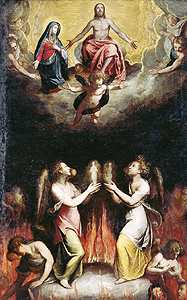Those who pay attention to Purgatory generally take up the practice of praying for the souls of the dead. This time honored practice is one of the most virtuous acts of charity.
Another attribute of those who pay attention to Purgatory is knowledge of their own faults which sin has caused in them, and a desire to correct it, beyond simply removing the guilt of sin. Through actions which are indulgenced these faithful generally improve more quickly than many others, as indulgences can nearly double the effect of many virtuous and soul improving acts and prayers. The spiritual treasury of the Church is thus opened unto them.
A fundamental truth of the Christian faith is that we will not be sinning in heaven. Sin and final glorification are incompatible. Therefore between the sinfulness of this life and the glories of heaven we must be made pure. Between death and glory there is a purification.Thus the Catechism of the Catholic Church states: "All who die in God's grace and friendship, but still imperfectly purified, are indeed assured of their eternal salvation; but after death they undergo purification, so as to achieve the holiness necessary to enter the joy of heaven. The Church gives the name Purgatory to this final purification of the elect, which is entirely different from the punishment of the damned". The concept of a purification after death from sin and the consequences of sin is also stated in the New Testament in passages such as 1 Corinthians 3:11-15, Matthew 5:25-26, and 12:31-32.
The doctrine of Purgatory, or the final purification, has been part of the true faith since before the time of Christ. The Jews already believed it before the coming of the Messiah, as revealed in the Old Testament (2 Macc. 12:41-46). Orthodox Jews to this day believe in the final purification, and for eleven months after the death of a loved one they pray a prayer called the Mourner's Qaddish for their loved one's purification. Jews, Catholics, and Eastern Orthodox have always historically proclaimed the reality of the final purification. It was not until the Protestant Reformers came in the 1500's that anyone denied this doctrine. As the following quotes from the early Church Fathers show, purgatory has been part of the Christian faith from the very beginning.
Some imagine that the Catholic Church has an elaborate doctrine of Purgatory worked out, but basically there are only three things that are essential components of the doctrine:Purgatory can be a place or simply a state of temporary atonement for those whom death’s angel calls before they have fully satisfied for their sins.
(1) that a purification after death exists
(2) that it involves some kind of pain, and
(3) that the purification can be assisted by the prayers and offerings of the living to God.
The duration of Purgatory is an interval of cleansing and purifying. The soul has a chance to make itself attractive for the Tremendous Lover, as a bride adorns herself for her husband. When the process is finished, the soul is admitted to the eternal wedding feast.
The Church gives us to understand that we can indeed befriend the deceased through our prayers and sacrifices, especially through the Eucharistic celebration at the altar. We are urged to offer prayers for prompt relief and release of those undergoing this purification. November is the month the Church dedicates to the faithful departed. Let us remember them not only in November, but throughout all the months of the year.
They were our relatives, our friends, bound to us by strong and tender ties. It might seem, from our sorrow, that we loved them for ourselves only. Yet we also loved them for themselves, for the merciful God who has called them to put on the garment of immortality.
Such is our brief earthly course: We come from the Father, we go to the Father. How long will He hide His Face from our departed? Perhaps they are already with Him, knowing greater happiness than life on earth can ever give.
The suffering souls sustain a true martyrdom of waiting. It is for us the living to throw the weight of our prayers into the merciful work of relieving them. If we help secure for those departed “displaced persons” access to the heavenly Jerusalem, they will return the favor in many ways until our turn comes. Let us be merciful to them, and we shall find mercy in our time of supreme need.
A woman, after the death of her husband ... prays for his soul and asks that he may, while waiting, find rest; and that he may share in the first resurrection. And each year, on the anniversary of his death, she offers the sacrifice.
Eternal rest grant unto them, O Lord



2 comments:
As Jesus said, the door to heaven is narrow and we should try hard to get through it. I think the majority of people will unfortunately go to hell because they live in a state of non-repentance for their mortal sins. Purgatory doesn't seem much better than hell, but at least one knows his/her salvation is assured. I've always wondered whether we might be spared purgatory if we make reparations for our sins on earth through prayer, sacrifice, fasting, etc.
That once saved belief of Protestants is a fallacy.
Thanks for your comments, Ji!
God bless you
Michael
Post a Comment